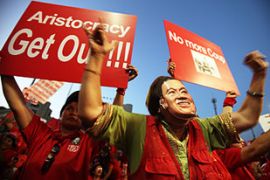Red shirts up pressure on Thai PM
Protesters rally outside military base, demanding PM resign and call elections.

| in depth | |||||||||
|
In a televised statement earlier on Monday he rejected the red shirts’ calls for parliament to be dissolved.
“The protesters have demanded that I dissolve the house before midday today, but the coalition parties agree the demand cannot be met,” Abhisit said.
“Elections must be held under common rules and genuine calm. We have to listen to other people’s voices, not just the protesters.”
After the statement he left the base aboard a Thai military helicopter.
Government officials told Al Jazeera that Abhisit wanted to personally survey the protest scene from the air before returning to the base.
Bangkok rally
Thousands of red shirt demonstrators began gathering in Bangkok on Friday, with around 150,000 attending a huge rally in the city on Sunday.
| Thailand’s Red Shirts |
|
|
Most red shirts are supporters of Thaksin Shinawatra, the former Thai prime minister ousted in a 2006 coup.
They believe the current government, led by Abhisit, did not take power legitimately and is propped up by segments of Thailand’s traditional ruling class who were threatened by Thaksin’s popularity, especially among the poor.
Many of the protesters travelled to Bangkok from Thailand’s poor, rural northern and eastern provinces – areas where support for Thaksin has traditionally been strongest.
So far the protests have been peaceful and leaders of the red shirts, known formally as the United Front for Democracy against Dictatorship (UDD), have pledged they will remain that way.
But Monday’s threat to step up disruption if Abhisit resists calls to stand down could spark anger by paralysing traffic-choked streets all over Bangkok.
Abhisit himself has warned the public not to be complacent about the potential for violence.
Determination
In his weekly television address on Sunday, the Thai prime minister indicated immediate elections were unlikely, citing the tense political climate and his government’s parliamentary majority.
|
“We have to see how the situation develops but I reaffirm that we will act reasonably and appropriately” Suthep Thaugsuban, |
However, Al Jazeera’s correspondent Wayne Hay, reporting from the 11th Infantry headquarters, said that despite Abhisit’s rejection of their demands the mood among the red shirts gathering outside the case was one of determination.
“They say they will achieve their goal of bringing down the government within days,” he said.
“The government in response to that has said they can protest as long as they want as long as they do not break any laws and disrupt the daily lives of the residents of Bangkok.”
In Bangkok several main roads near government offices were blocked off either by protesters’ pick-up trucks and motorcycles, or cordoned off by police and soldiers.
Authorities have deployed 50,000 police, soldiers and other security personnel at key points in the capital, with thousands more placed on alert at barracks across the city.
An army spokesman said security had been beefed up with hundreds of extra troops at the infantry base where Abhisit and other key ministers along with the country’s top brass were staying during the protests.
Suthep Thaugsuban, the Thai deputy prime minister in charge of the country’s security, said the protesters would be permitted to approach the base but added that it was too early to say if emergency rule would be invoked to crackdown on the rally.
“Protesters can circle the barracks but they must not obstruct traffic or intrude into the barracks or they will be arrested,” Suthep told reporters.
“We have to see how the situation develops but I reaffirm that we will act reasonably and appropriately.”
‘Victim of bullies’
Last April, mass protests by the red shirts led to violent clashes on the streets of Bangkok with at least two people killed and 120 injured in the capital’s worst unrest in almost two decades.
Red shirt leaders say the violence was stirred up by gangs of hired pro-government thugs.
The Red Shirts are loyal to Thaksin, who was ousted in a coup in 2006 and is living abroad, mostly in Dubai, to escape a jail term for corruption.
Last month Thailand’s supreme court confiscated $1.4bn of his assets after ruling the money had been obtained through abuse of power when he was prime minister.
In an address to supporters on Sunday night he urged them to keep up the fight against those in the Thai elite he says are destroying the country’s democracy.
“This is not a one-person issue, we all fight for justice. I am the victim of bullies among the elites,” Thaksin told the rally in a 50-minute video message.
“To solve problems related to democracy, equality and justice, the ruling elites won’t be able to do that because they don’t have the conscience. The people will have to do it.”
Thailand has been in constant political turmoil since early 2006, when anti-Thaksin demonstrations began following his ouster in a military coup.
The Red Shirts have held a number of rallies since Abhisit came to power in December 2008, after a court decision removed Thaksin’s allies from government.

 Supporters of former PM Thaksin Shinawatra, ousted in bloodless coup in 2006
Supporters of former PM Thaksin Shinawatra, ousted in bloodless coup in 2006